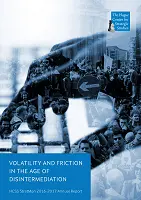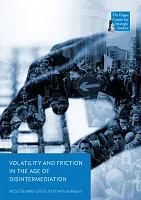Het Den Haag Centrum voor Strategische Studies (HCSS) en Instituut Clingendael presenteren vandaag hun Monitors 2017 in De Glazen Zaal, Den Haag. Beide instituten brengen sinds 2012 jaarlijks hun monitor uit als onderdeel van de Strategische Monitor van de Nederlandse overheid.
HCSS StratMon 2017: Volatility and Friction in the Age of Disintermediation
Toespraak van Minister Koenders tijdens de uitreiking.
Sinds het begin van de jaren 2000 is er sprake van een mondiale neerwaartse trend in de internationale samenwerking, en een opwaartse trend ten aanzien van conflict. Dit veroorzaakt toenemende spanningen en crises.
De HCSS StratMon concludeert dit aan de hand van datasets die inzicht geven in de mondiale trends in conflict, samenwerking en confrontatie.
Conflict toename
Het totaal aantal slachtoffers van gewelddadige conflicten in 2016 is afgenomen ten opzichte van 2015 (van 137,333 naar 116,907), maar is nog steeds op historisch hoog niveau sinds 2004. Bovendien is sinds 2000 het aantal burgeroorlogen met een internationale dimensie, zoals de strijd in Irak, Jemen, Oekraïne en Syrië verviervoudigd.
De HCSS StratMon stelt dat in Tsjaad, Bangladesh, Angola, Guinee en Kameroen het risico op conflict in 2017-2018 het grootste is. Dit blijkt vooral uit de analyse van de economische weerbaarheid, het type politiek regime en etnische spanningen.
Gevaren
Tevens stelt de monitor vast dat de huidige fragiele situatie in Venezuela een potentiële bedreiging vormt voor de Nederlandse Antillen.
Spanningen en crises worden veroorzaakt door de machtsverschuivingen in de wereld, de opkomst van (economisch) nationalisme en populisme. Ook worden deze veroorzaakt door ‘disintermediation’, het ontstaan van een netwerksamenleving waarin hiërarchieën wegvallen en overheden niet langer kunnen sturen op de wijze waarop ze dat gewend waren.
Door revolutionaire technologieën kunnen mensen en organisaties direct contact met elkaar hebben. De opkomst van IS, Uber en Airbnb en tweets van president Trump zijn daar voorbeelden van. Dit verreist een fundamentele aanpassing van het buitenland- en veiligheidsbeleid.
Aanbevelingen:
HCSS beveelt aan dat de Rijksoverheid het veiligheidsbeleid verbreedt naar alle sectoren van de overheid en private partijen. Voor de coördinatie ervan dient een Nationale Veiligheidsraad te worden opricht. Dit moet tevens leiden tot verbetering van het strategisch denk- en handelingsvermogen van Nederland dat door de historische veranderingen in de internationale betrekkingen steeds meer zijn eigen positie moet bepalen.
Optimisme
Toch is er ook reden voor optimisme: de toegang tot financiële en economische diensten, tot schoon water en duurzame energie neemt wereldwijd toe. Dit verhoogt de zelfredzaamheid van honderden miljoenen personen over de hele wereld, wat leidt tot positieve verandering in de toekomst.
Video toelichting:








